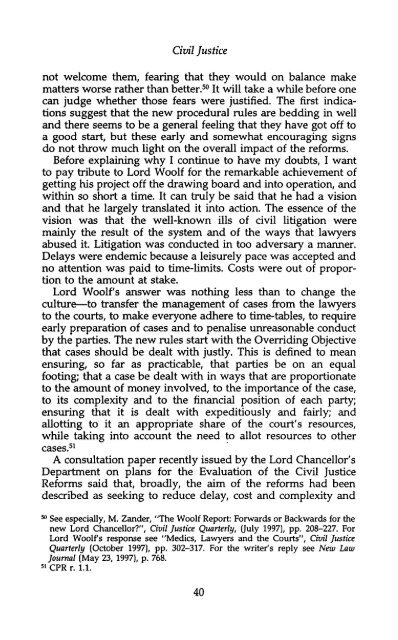HAMLYN - College of Social Sciences and International Studies ...
HAMLYN - College of Social Sciences and International Studies ...
HAMLYN - College of Social Sciences and International Studies ...
You also want an ePaper? Increase the reach of your titles
YUMPU automatically turns print PDFs into web optimized ePapers that Google loves.
Civil Justice<br />
not welcome them, fearing that they would on balance make<br />
matters worse rather than better. 50 It will take a while before one<br />
can judge whether those fears were justified. The first indications<br />
suggest that the new procedural rules are bedding in well<br />
<strong>and</strong> there seems to be a general feeling that they have got <strong>of</strong>f to<br />
a good start, but these early <strong>and</strong> somewhat encouraging signs<br />
do not throw much light on the overall impact <strong>of</strong> the reforms.<br />
Before explaining why I continue to have my doubts, I want<br />
to pay tribute to Lord Woolf for the remarkable achievement <strong>of</strong><br />
getting his project <strong>of</strong>f the drawing board <strong>and</strong> into operation, <strong>and</strong><br />
within so short a time. It can truly be said that he had a vision<br />
<strong>and</strong> that he largely translated it into action. The essence <strong>of</strong> the<br />
vision was that the well-known ills <strong>of</strong> civil litigation were<br />
mainly the result <strong>of</strong> the system <strong>and</strong> <strong>of</strong> the ways that lawyers<br />
abused it. Litigation was conducted in too adversary a manner.<br />
Delays were endemic because a leisurely pace was accepted <strong>and</strong><br />
no attention was paid to time-limits. Costs were out <strong>of</strong> proportion<br />
to the amount at stake.<br />
Lord Woolf's answer was nothing less than to change the<br />
culture—to transfer the management <strong>of</strong> cases from the lawyers<br />
to the courts, to make everyone adhere to time-tables, to require<br />
early preparation <strong>of</strong> cases <strong>and</strong> to penalise unreasonable conduct<br />
by the parties. The new rules start with the Overriding Objective<br />
that cases should be dealt with justly. This is denned to mean<br />
ensuring, so far as practicable, that parties be on an equal<br />
footing; that a case be dealt with in ways that are proportionate<br />
to the amount <strong>of</strong> money involved, to the importance <strong>of</strong> the case,<br />
to its complexity <strong>and</strong> to the financial position <strong>of</strong> each party;<br />
ensuring that it is dealt with expeditiously <strong>and</strong> fairly; <strong>and</strong><br />
allotting to it an appropriate share <strong>of</strong> the court's resources,<br />
while taking into account the need to allot resources to other<br />
cases. 51<br />
A consultation paper recently issued by the Lord Chancellor's<br />
Department on plans for the Evaluation <strong>of</strong> the Civil Justice<br />
Reforms said that, broadly, the aim <strong>of</strong> the reforms had been<br />
described as seeking to reduce delay, cost <strong>and</strong> complexity <strong>and</strong><br />
50 See especially, M. Z<strong>and</strong>er, "The Woolf Report Forwards or Backwards for the<br />
new Lord Chancellor?", Civil Justice Quarterly, (July 1997), pp. 208-227. For<br />
Lord Woolf's response see "Medics, Lawyers <strong>and</strong> the Courts", Civil Justice<br />
Quarterly (October 1997), pp. 302-317. For the writer's reply see New Law<br />
Journal (May 23, 1997), p. 768.<br />
51 CPR r. 1.1.<br />
40

















